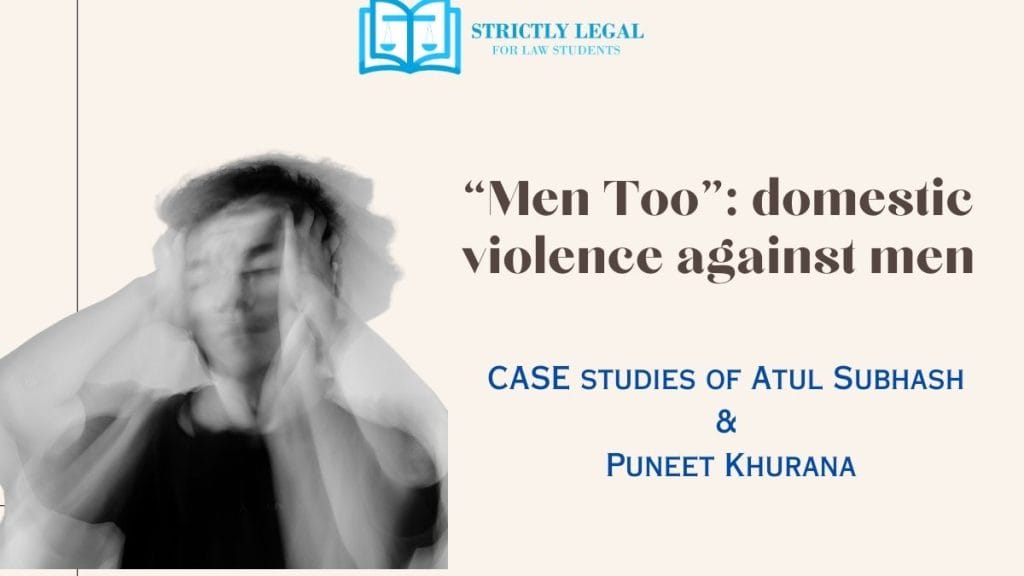Domestic violence is often perceived as a problem that predominantly affects women, given its extensive media coverage, legal provisions, and social support systems. However, domestic violence against men is a growing concern globally and in India, where male victims frequently face stigma and societal pressures that prevent them from seeking help. In Indian society, there are traditional gender roles where men are expected to be the primary earners and protectors, while women are expected to be caregivers. This leads to a belief that men cannot be victims of domestic violence, or if they are, they are perceived as weak or failing in their roles.
Men can face physical violence, but it often goes unnoticed. Society may dismiss minor physical altercations as normal conflicts or as men’s fault. Many men suffer injuries like bruises, cuts, or even broken bones at the hands of their wives or female partners but may not report them due to fear or shame. However, when it comes to Emotional or Psychological Abuse it often goes unnoticed or given no attention to. Men might face constant humiliation, belittling, verbal insults, threats, or manipulation by their female partners. This can lead to severe mental health issues like depression, anxiety, and low self-esteem. Another form of domestic violence against men in India is the misuse of legal provisions by women, such as false claims of abuse, dowry harassment, or cruelty. This can lead to wrongful arrest, social stigmatization, and financial ruin for men.
Table of Contents
What is Domestic Violence at large?
Domestic violence (DV) is a pattern of behavior in which one partner in an intimate relationship seeks to control and dominate the other through various forms of abusive tactics. It is a widespread social problem that can occur in any relationship, regardless of gender, age, race, or socioeconomic status. Domestic violence can take many forms, including physical, emotional, psychological, sexual, and economic abuse, and it often has a devastating impact on the victim, leading to long-term physical, mental, and emotional harm. Domestic violence is any form of abusive behavior, whether physical, emotional, sexual, or economic, that one partner uses to control or intimidate the other in an intimate relationship, such as marriage, cohabitation, or dating. The goal of the abuser is to assert power, control, and dominance over the victim, often through repeated and escalating acts of violence. It is difficult for many to accept that males may experience domestic abuse in the same way as women in a nation like India, which has been ruled by men for centuries. Therefore, there might be a reason why Indian laws do not recognize domestic abuse against men. Contrary to conventional assumption, however, more males are being physically and psychologically assaulted by women.
Case Study of Atul Subhash
Atul Subhash (Now Late Atul Subhash) worked as an AI Engineer in the city of Bengaluru died by committing suicide this December in the city, leaving behind a 70 minutes video and a 40 page long suicide note explaining the cause and reason of his death and how badly he and his family was harassed and agonized by his in-laws, his brother in law and his wife. All this hassle was caused due to constant nagging and pestering from his better half and her parents. The continuous demands for providing them with a maintenance of a lumpsum amount of money irrespective of the fact that Atul’s wife- Nikita had a well paying job at Accenture, Delhi. The incessant turmoil that Atul and his aged parents had to face was unendurable by Atul for which he had to take a step like this.
Coming forward to a similar case of Puneet Khruana who is a supposedly a cafe owner in Delhi, almost touching 40s, committed suicide in the Model Town Area of Delhi leaving behind series of videos where he had alleged his wife and in-laws responsible for the reason behind his suicide. The reason being unreasonable and unusual demands from his wife and in-laws that was certainly not in Puneet’s capacity to pay. It was further alleged that the couple had mutually consented to divorce and upon arriving at the same, he was further informed by his wife that he is to pay an amount of 10 lakhs extra, which acted as a nail in the coffin for Puneet. Family members of Puneet have also claimed post his demise that his wife, Manika Pahwa didn’t only try to extract ransom money from him but had also tried to emotionally manipulate along with activities like hacking or keeping a track of Puneet’s social media accounts. Puneet’s mother said nobody in his family had a pinch of idea for the suffering he had, resulting Puneet to suffer in silence out bursting his emotion into something so grave like committing suicide.
It is to note that both these cases came into limelight only because both the cases had a pattern of leaving behind a suicide video note explaining the reasons for the same, however there are tons of unheard, untold cases of men being a prey to Domestic Violence which nobody has an idea about.
Reasons for both the cases
The major problem behind both the case mentioned above is, nobody in our society actually sits down to talk about what a “man” goes through in his life. It is a well made and believed fact of the so called patriarchal society that life’s easy for men at large and there’s almost nothing that might go wrong for them. Little does anybody know, what men go through in their lives. The very fact that men “Can” be victims of Domestic Violence from their better half is a topic that no one talks or discusses about. That topic itself is so uncomfortable that, instead of finding a solution to it, people rather choose to suffer in silence pretending to be happy in their lives. We often come across NGOs like “Mahila Mukti Morcha” or National Commission for Women but how many are there for men? Barely any. If such a scenario would have happened with a married woman, the same authorities would have termed it as “Dowry Death”, “Cruelty by husband and in-laws” and what not, because it’s a pre-notional assumption that the victim is always a “woman” and the predator is always a “man”. While there are women’s shelters and helplines, there are very few (almost none) available for male victims of domestic violence.
Why do male victims of DV suffer in silence?
Male victims of domestic violence (DV) often suffer in silence due to a combination of societal, psychological, and practical factors. The stigma surrounding male victimhood, as well as the lack of support systems, can lead men to remain silent about their abuse.
Perception of Masculinity
Men are frequently portrayed as powerful, stoic, and domineering by traditional gender norms. Men find it hard to admit when they are vulnerable or abused because they are indoctrinated to think that they should be able to manage challenging circumstances and defend themselves. These cultural norms are violated by admitting to being a victim of assault, which results in feelings of emasculation and shame.
Fear of Mockery
The very fear of being mocked or ridiculed if they report abuse. The idea that men cannot be victims of domestic violence is deeply ingrained in many societies, and men often worry that they will be seen as weak or unmanly if they speak out. This fear of judgment can lead to emotional isolation and reluctance to seek help.
Gender Biasness in Enforcement of Law
As mentioned earlier, pre-notional assumption that the victim is always a “woman” and the predator is always a “man”. There is a common misconception that women are more likely to experience domestic abuse, which makes men seem less worthy of protection. Male victims may feel defenseless and abandoned because they fear that authorities would not believe them or will reject their stories.
Battle of Custody
Last but not the least, who wants to lose their child after all? In cases of separation or divorce, men often fear losing custody of their child/children if they report abuse as it is always analyzed that the child needs their mother for a better upbringing irrespective of their competency. The fret that they will be portrayed as unfit fathers or that their ability to protect their children will be questioned, and for that very fact the custody being given to the mother instead of them, is yet another drawback that holds them to not fight or suffer in silence.
Conclusion
Domestic violence against men is a serious and often overlooked issue that deserves greater attention. While much of the focus has historically been on women as victims, men can also face physical, emotional, and psychological abuse within relationships. This violence can take many forms, including physical assault, verbal degradation, manipulation, financial control, and even sexual abuse. Men may hesitate to report such abuse due to societal stigma, which portrays them as being unable to be victims of violence or as less deserving of support. The lack of appropriate legal frameworks, social services, and shelters specifically for men further complicates their ability to escape abusive situations. Challenging the prevailing gender stereotypes and providing a more inclusive support system are essential steps toward ensuring that male victims of domestic violence are heard, supported, and given the tools to break free from abusive relationships. It’s critical to address this issue with the same urgency and care afforded to all victims of domestic violence, regardless of their gender.

Law student.
Turning legal insights into engaging narratives.





